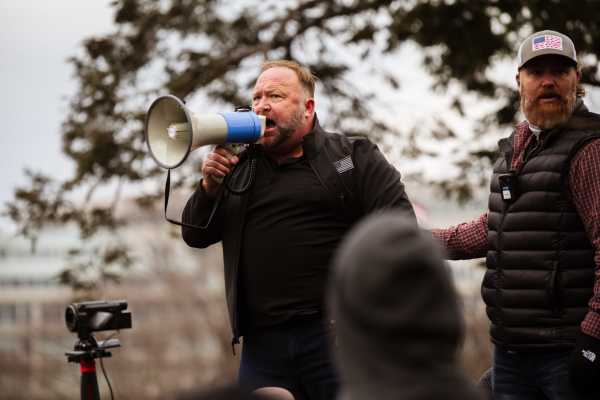
Alex Jones has made a business of saying things that are false, conspiratorial, and paranoid. In these ways and more, he is exactly like America’s most respected journalists. His false claims about Sandy Hook caused real suffering. So did the New York Times’s reports about WMD. He has drawn false connections between his enemies, just as reputable men did between Osama bin Laden and Saddam Hussein. He has told countless lies about Hillary Clinton, though no more than mainstream journalists have told about Donald Trump.
If Alex Jones had promoted Russiagate rather than a downscale conspiracy, he might have received a Pulitzer Prize. If he had relayed untruths on behalf of the elite rather than saying things true and false at its expense, he might be editing the Atlantic. If he had pretended to seriousness rather than clowning, he might even now be spreading paranoia on MSNBC. As it is, he is banned from every platform and broadly despised, condemned by people who have no right to judge him.
Advertisement
Alex’s War, a new documentary by Alex Lee Moyer, shows that Alex Jones has much to apologize for. But it also suggests that he is far from uniquely guilty. Moyer’s previous film, TFW No GF, took an unprejudiced look at the disaffected young men sometimes called incels. The director brings the same sympathetic, ironical eye to the story of Alex Jones. Through interviews and archival footage, she follows Jones from his turbulent boyhood in Dallas to his breakout on public-access TV to his present infamy.
It is a very American story. Though he is sometimes described, along with other members of the American right, as a promoter of “fascism” or some other foreign ideology, he in fact reflects a very American strain of mistrust of elites. This mistrust is an instinct far deeper than the shallow bromides of libertarian ideologues. It comes from the same currents of sentiment that have shaped American religious populism from the Second Great Awakening to the Azusa Street Revival. It combines flamboyant, crowd-pleasing expression with an abiding contempt for clerisies.
Growing up in Dallas, near TV preachers, Jones was fascinated by their hypocrisies. They lived in “really big houses right on the lake,” he tells Moyer. “You’d see them on the back porch drinking tequila and snorting cocaine off prostitutes’ breasts.” During a panel at the film’s launch in Austin, Glenn Greenwald suggested that Jones resembled those high and holy rollers. Jones agreed: “I’m a preacher. I am the crazy preacher.”
Another important influence was Gary Allen’s None Dare Call It Conspiracy, published in 1971. Allen, a prominent member of the John Birch Society, argued that finance and politics were controlled by a well-connected group of “insiders,” whose secret workings had wide-ranging effects (“In politics, nothing happens by accident. If it happens, you can bet it was planned that way”). Aside from his influence on Jones, Allen is notably the father of Michael Allen, longtime author of Politico’s “Playbook” newsletter and co-founder of Axios. Allen’s work, like that of his father, assumes the importance of, and exploits interest in, political insiders. It also seeks, in the words of the New York Times, to be “first with a morsel of information, whether or not the morsel proves relevant, or even correct, in the long run.”
This biographical curiosity merely underlines the family resemblance between “disinformation” and ostensibly responsible “reporting.” If Jones’s alienation from the centers of elite power leads him to false and exaggerated conclusions, much the same happens to well-connected journalists who parrot what a self-interested establishment has to say.
Subscribe Today Get weekly emails in your inbox Email Address:
Very few artists are willing to risk being seen as sympathetic to figures our establishment has resolved to destroy. That is what makes this film so valuable. Moyer’s document is no hagiography. But by refusing to join in the chorus of condemnation, she has created a film of great intelligence and subtlety. The same taste shown in the direction is brought to the score, which improbably combines Wagner, a remix of Hillary’s cackling over the death of Muammar Gaddafi, and music from Ariel Pink.
Moyer begins her film with footage of pro-Trump protestors gathering in Washington, D.C., and returns repeatedly to the role Jones played in promoting the electoral protests on Jan. 6. Surprisingly, perhaps, the film shows that on the actual day of the protest, Jones was a voice of moderation. He can be heard loudly urging peace and asking people to comply with the authorities. Jones may deserve blame for leading people up to a threshold and then urging them not to step across it. But he clearly saw how disorder on that day would be used to justify harsh penalties.
After years of presenting the establishment—the system—as not just malign but all-powerful, he found that it is sometimes weaker than it seems. Discussing the events of Jan. 6, Jones expresses surprise that there weren’t enough police there to maintain order. “I just expected that the system would be in place, and it wasn’t.”
Advertisement
Sourse: theamericanconservative.com






